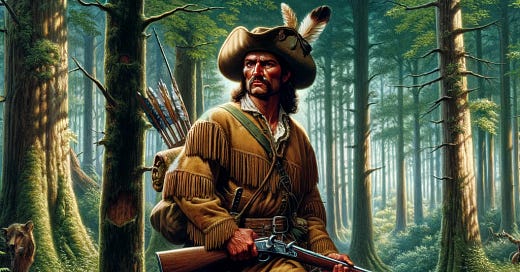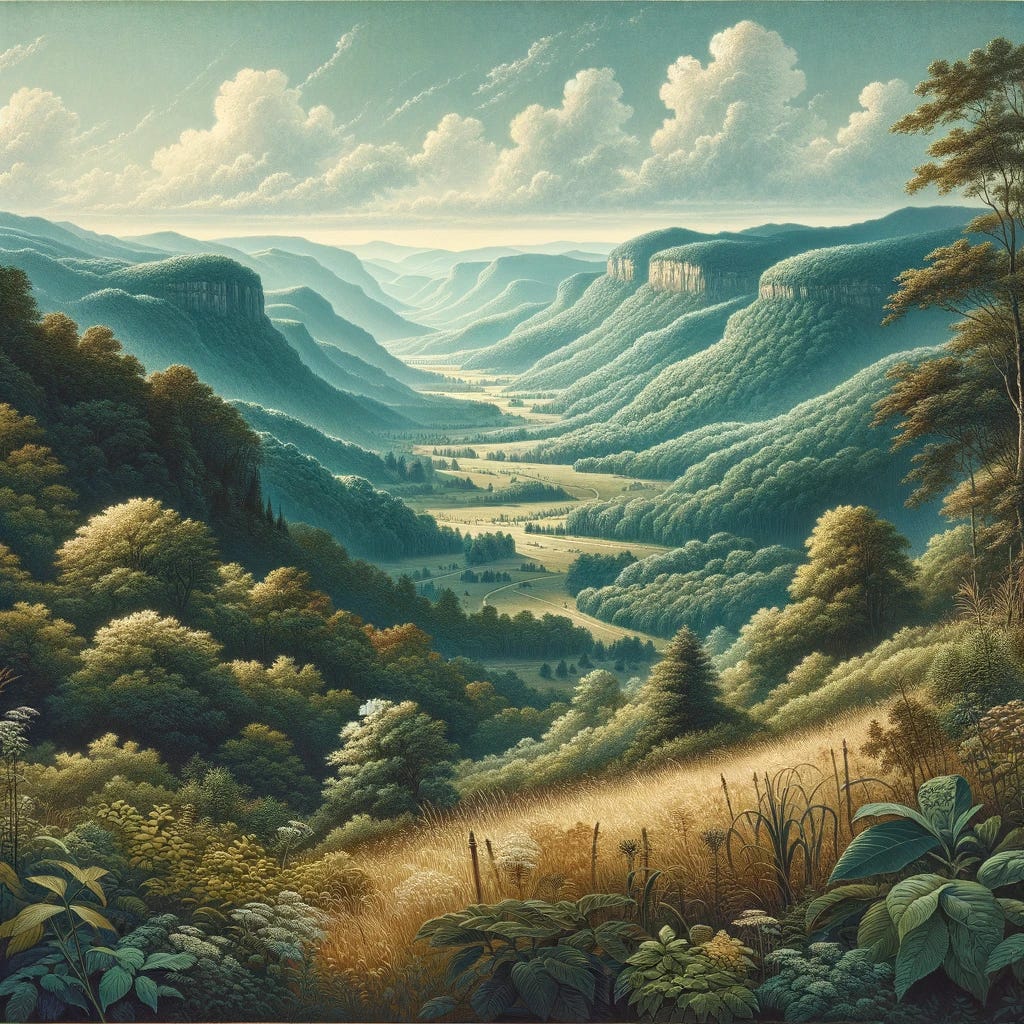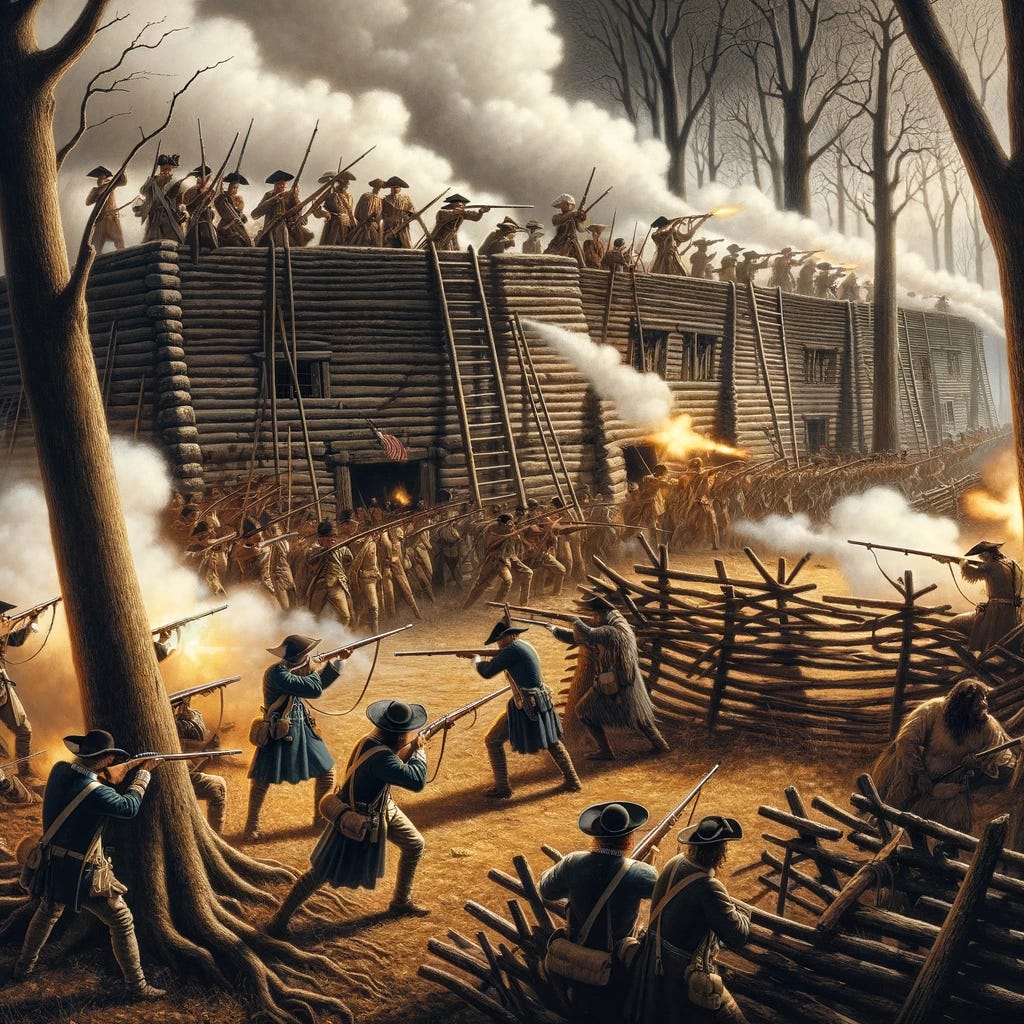Exploring the Wilderness: Daniel Boone's Legacy
Trailblazer of the American Frontier: Examining the Life and Influence of a Legendary Pioneer
In the pantheon of American legends, few figures capture the imagination quite like Daniel Boone. His name resonates through the annals of early American history, symbolizing the rugged, adventurous spirit that characterized the nation's frontier era. Boone, an intrepid explorer and pioneer, played a pivotal role in the westward expansion of the United States. His exploits through the dense forests and uncharted territories of America not only paved the way for countless settlers but also ingrained him as a folk hero in the national consciousness.
This essay embarks on a journey through Boone's life, unraveling his adventures, his role in shaping American history, and the legacy he left behind. We will traverse the landscapes of his early upbringing, his audacious explorations, his involvement in the Revolutionary War, and the folklore that embellished his life into a larger-than-life tale. As we delve into the life of Daniel Boone, we uncover not just the story of a man, but the genesis of an American archetype, the frontiersman.
The Making of a Frontier Legend
Born on November 2, 1734, in a modest Quaker household in Berks County, Pennsylvania, Daniel Boone was destined to become synonymous with American frontier adventure. The sixth of eleven children, Boone inherited a blend of resilience and independence from his English and Welsh parents, Squire and Sarah Boone. This resilience was not just a family trait, but a necessity in the rugged, untamed environment of colonial America.
Boone's early life was marked by a constant movement. His family, facing religious persecution due to their Quaker faith, moved to North Carolina's Yadkin Valley, a decision that would profoundly influence young Daniel. This verdant, yet untamed landscape, became his classroom. Unlike the traditional education of the time, Boone's learning was the wilderness itself. His days were spent navigating through thick forests, hunting, and acquainting himself with the indigenous Lenape people, whose survival skills and knowledge of the land were invaluable.
This period was crucial in shaping Boone's character. The wilderness instilled in him not only a sense of independence but also a deep respect and understanding of nature's unspoken rules. His proficiency with the rifle and his uncanny ability to read the terrain and track animals became legendary, setting the foundation for the remarkable path he would blaze in American history.
As Boone grew, so did his reputation as a skilled hunter and woodsman. His early forays into the wilderness were more than just escapades; they were the formative experiences of a man who would become an icon of the American frontier. It was this unique upbringing, rooted in the heart of the wild, that prepared Daniel Boone to step into the pages of history, not merely as a man, but as a symbol of the untamed spirit of a burgeoning nation.
Trailblazer of the American Frontier
Daniel Boone's legacy is most profoundly felt in his explorations and settlements, ventures that were as perilous as they were pivotal in American history. His journeys were not mere travels; they were epic narratives of courage, resilience, and an unyielding quest for new horizons.
The Cumberland Gap Odyssey
The Cumberland Gap expedition stands as one of Boone's most significant achievements. In 1775, he was commissioned by the Transylvania Company to forge a trail into the heart of Kentucky, a lush and unspoiled land that was then considered the far western frontier. This task was monumental and fraught with danger, from treacherous landscapes to the ever-present threat of hostile encounters.
Boone's expedition involved cutting a path through the dense, shadowy forests of the Appalachian Mountains, leading a group of about thirty men. This path, which became known as the Wilderness Road, was more than a physical route; it was a gateway to the West, a conduit through which the future expansion of America would flow. Boone's leadership and wilderness skills were tested to their limits, but his determination saw the mission through. The successful forging of the Wilderness Road marked a turning point in American history, opening Kentucky to waves of European settlers.
The Harrowing Settlement of Boonesborough
Following the trailblazing of the Wilderness Road, Boone went on to establish Boonesborough, one of the first English-speaking settlements west of the Appalachian Mountains. The settlement, situated on the banks of the Kentucky River, was a beacon of the American pioneering spirit, but it was also a place of constant danger.
Boonesborough's settlers faced myriad challenges. They battled not only the harsh wilderness conditions but also the resistance of Native American tribes, who rightly saw the encroachment of settlers as a threat to their way of life. Boone himself was captured by Shawnee warriors in 1778, a testament to the perilous nature of frontier life. His daring escape, trekking over 150 miles through dense forest to warn Boonesborough of an impending attack, became the stuff of legend, a testament to his grit and tenacity.
Boone's role in the settlement of Kentucky was not just about carving out a piece of land; it was about embodying the spirit of exploration and the relentless pursuit of the unknown. His settlements were more than mere habitations; they were symbols of the American dream, the aspiration for a better life in the vast, unexplored lands of the New World.
Boone’s Impact on the Westward Expansion
Boone's explorations and settlements had a far-reaching impact on the westward expansion of the United States. His journeys laid the groundwork for the countless pioneers who followed, pushing the boundaries of the fledgling nation westward. Boone's Wilderness Road became a major artery of migration, facilitating the movement of over 200,000 settlers into Kentucky by the end of the 18th century.
Yet, this expansion was not without its consequences. Boone's settlements marked the beginning of the displacement of Native American tribes from their ancestral lands, a dark and often overlooked aspect of America's westward expansion. Boone himself had a complex relationship with Native Americans, respecting their skills and knowledge of the land but also being a part of the process that ultimately led to their displacement.
Daniel Boone's explorations and settlements were a defining chapter in the story of America's expansion. His adventures were not just feats of individual courage; they were the embodiment of a nation's manifest destiny, the inexorable push towards the Pacific. Boone's legacy in this regard is twofold: he is celebrated as a pathfinder and pioneer, but his story also prompts reflection on the costs of expansion and the histories of those who were displaced in the process.
Frontiersman in the Fight for Independence
Daniel Boone's life was not only defined by his explorations and settlements but also by his involvement in the American Revolutionary War. His role in this tumultuous period was a complex interplay of his skills as a frontiersman and his loyalty to the emerging notion of an American nation.
Boone's Militia Leadership and Defense of the Frontier
When the Revolutionary War broke out, Boone's allegiance was to the American cause. His extensive knowledge of the frontier made him an invaluable asset. He was a natural leader, not through formal military training, but through his deep understanding of survival and combat in the wild terrains of America.
Boone's primary role was in the defense of the Kentucky frontier. He was appointed a lieutenant colonel in the militia and tasked with protecting the settlements from British and Native American attacks. These were not conventional battles but guerilla-style warfare, where Boone's skills as a woodsman were as crucial as his leadership. His ability to navigate the treacherous landscapes, anticipate enemy movements, and sustain his men in dire conditions was pivotal in maintaining the American hold on the Kentucky frontier.
The Siege of Boonesborough
One of Boone's most notable military engagements was the defense of Boonesborough against a siege in 1778. Following his capture and subsequent escape from the Shawnee, Boone learned of their plans to attack the settlement. His warning allowed the settlers to prepare, leading to a spirited defense that lasted for days. Boone's leadership during the siege was a testament to his strategic acumen and his unwavering commitment to the safety of his fellow settlers. The successful defense of Boonesborough was a significant victory, maintaining American control over a crucial frontier settlement.
The Impact of War on Boone's Life
The Revolutionary War had a profound impact on Boone's life. His wealth was depleted, his lands were constantly under threat, and he faced personal tragedies, including the loss of a son during the war. Despite these hardships, Boone's resolve never wavered. His contribution to the war effort was not just in battles fought but in the symbol he represented: the American frontiersman, resilient and steadfast in the face of adversity.
Boone's role in the Revolutionary War is often overshadowed by his exploits as an explorer, but it was equally significant. He was a bridge between the colonial settlers and the frontier, playing a critical role in the defense and survival of the early American settlements. His participation in the war underscored his commitment to the American cause and his belief in the ideals that would come to define the nation.
The Twilight Years of an American Icon
As the echoes of the Revolutionary War faded, Daniel Boone, now in the autumn of his life, continued to embody the spirit of the American frontier. His later years were a reflection of the changing landscape of a nation he helped to forge and a testament to his enduring legacy.
Boone's Migration and Final Years
Post-war, Boone found himself embroiled in legal battles over land claims. The very lands he helped settle and defend were slipping through his fingers due to the complexities of land titles in the new America. Disheartened but undeterred, Boone looked westward once again, continuing his lifelong pursuit of the frontier.
In 1799, seeking a fresh start, Boone moved to Spanish Louisiana (present-day Missouri), a territory not yet part of the United States. Here, he was granted a tract of land by the Spanish government, and once more, he settled into the life of a frontiersman, hunting and trapping until his final days. Boone died on September 26, 1820, at the age of 85, leaving behind a legacy that was as vast as the territories he explored.
Boone's Enduring Legacy
Daniel Boone's legacy is multifaceted. He is celebrated as a symbol of American exploration and the pioneering spirit, a man who ventured into the unknown with a rifle in hand and a determination in his heart. His contributions to America's westward expansion are undeniable, having opened up new territories for settlement and exploration.
Yet, Boone's legacy is also tinged with the complexities of American history. His life and actions are intertwined with the displacement of Native American tribes, an aspect that invites a more nuanced reflection on his role in American history.
Boone's life has been romanticized in folklore and popular culture, often blurring the line between myth and reality. He has been the subject of countless books, movies, and television shows, sometimes depicted as a larger-than-life hero, other times as a simple man of the wilderness. This cultural portrayal has cemented his place as an American folk hero, a representation of the rugged individualism and adventurous spirit that many associate with the early days of the American frontier.
Reflections on Boone's Place in History
In reflecting on Boone's place in history, one must consider both the man and the myth. He was not just a fearless explorer but also a father, a husband, and a leader. His life was a tapestry of triumphs and tragedies, adventures and misfortunes, set against the backdrop of a nation in its infancy.
Daniel Boone's story is a chapter in the larger narrative of America's formation and expansion. His footprints on the trails of the American wilderness are indelible, and his name is forever etched in the annals of American history. Boone was more than just a frontiersman; he was a harbinger of the American dream, a symbol of the unquenchable thirst for exploration and discovery that defined a nation.
The Legend of Daniel Boone: Myth and Reality
Daniel Boone's stature as an American icon is as much a product of the tales and legends that sprang up around him as it is of his actual deeds. His life, steeped in adventure and peril, became fertile ground for folklore and cultural representation, transforming Boone from a historical figure into a symbol of the American frontier.
Boone in American Folklore
The folklore surrounding Daniel Boone began to take shape during his lifetime and burgeoned after his death. Boone was often portrayed as a man of superhuman strength and skill, a lone wanderer of the wilderness, and a fearless fighter. These stories, while rooted in his genuine adventures, were embellished and romanticized, creating a larger-than-life character.
This mythical Boone, who could tame the wildest of lands and stand undaunted in the face of danger, resonated deeply with the American public. He became a folk hero, a representation of the rugged, independent spirit that Americans admired and aspired to. The tales of his exploits were passed down through generations, each retelling adding to the legend.
Boone in Literature and Media
The mythologization of Boone was further propelled by his portrayal in literature and media. Books, plays, and later films and television shows depicted him as the quintessential frontiersman. Perhaps the most influential of these portrayals was James Fenimore Cooper's character Natty Bumppo, also known as "Hawkeye," in "The Leatherstocking Tales." Though not directly Boone, Bumppo's character was heavily inspired by Boone's legend.
In the 20th century, Boone's image was popularized by television series and movies, often focusing on his adventures and encounters with Native Americans. These portrayals, while entertaining, sometimes perpetuated stereotypes and historical inaccuracies, contributing more to the myth than the man.
The Dichotomy of Boone's Representation
The cultural representation of Boone presents a dichotomy. On the one hand, it celebrates the pioneering spirit and the bravery inherent in exploring and settling new frontiers. On the other hand, it often glosses over the more complex and problematic aspects of his life and the era he lived in, particularly the impact of westward expansion on Native American communities.
Boone's representation in folklore and media has become a part of the collective American consciousness, painting a picture of a hero of the wilderness. This image, while inspiring, requires a nuanced understanding that separates the man from the myth. The real Daniel Boone was indeed a skilled hunter, an intrepid explorer, and a significant figure in American history, but he was also a man of his time, with all the complexities and contradictions that entailed.
Reevaluating the Legacy of Daniel Boone
In assessing the legacy of Daniel Boone, it is essential to engage in a critical analysis that considers both his contributions to American history and the broader implications of his actions. Boone's role in the westward expansion and his interactions with Native American tribes invite a contemporary reevaluation of his place in history.
Boone and the Westward Expansion
Daniel Boone is often celebrated as a symbol of America's westward expansion, a pioneer who braved unknown territories and paved the way for settlers. His exploration of Kentucky and the establishment of the Wilderness Road were instrumental in opening the western frontier. Boone's daring and resilience embody the spirit of exploration and discovery that characterized the American ethos during this period.
However, this narrative of expansion and settlement is intertwined with the displacement of indigenous populations. Boone's ventures, while pioneering, were part of a larger movement that encroached upon Native American lands, leading to their forced removal and the loss of their traditional way of life. This aspect of Boone's legacy is complex and requires a balanced consideration of both his achievements and the detrimental impact of these achievements on indigenous communities.
Contemporary Perspectives on Boone
Modern perspectives on Daniel Boone often grapple with this duality. On one hand, he is revered as a national hero, a frontiersman who exemplifies the adventurous and indomitable spirit of early America. On the other hand, there is a growing recognition of the historical context in which he operated—the conflicts and consequences of colonial expansion.
This reevaluation does not diminish Boone's skills or his significance in American history but rather places his life and actions within a broader historical framework. Understanding Boone's role in the context of his time allows for a more nuanced appreciation of his contributions and a more profound understanding of the era's complexities.
Boone's Place in American Historical Narrative
Daniel Boone's life story is a microcosm of the American historical narrative of the late 18th and early 19th centuries. His adventures highlight the courage and determination of the American spirit, while his interactions with Native American tribes and the consequences of westward expansion reveal the darker aspects of American history.
As such, Boone's legacy serves as a platform for discussion and reflection on the nation's past. It is a legacy that invites examination of the values, challenges, and contradictions that have shaped American history. Daniel Boone, the man and the myth, remains a significant figure, not only for his individual accomplishments but also for what his story reveals about the broader American experience.
The Enduring Legacy of Daniel Boone: A Confluence of Myth and Reality
In conclusion, the life and legacy of Daniel Boone present a compelling narrative that intertwines myth and reality, highlighting both the triumphs and tribulations of the American frontier. Boone's story is not just a tale of individual bravery and adventure; it is emblematic of a pivotal era in American history.
Summarizing Boone's Life and Impact
Daniel Boone's journey from a young woodsman in the wilds of Pennsylvania to a legendary figure in American history is a testament to his extraordinary skills, determination, and courage. His explorations and settlements, particularly in Kentucky, laid the groundwork for America's westward expansion, contributing significantly to the nation's growth and development. Boone's role in the Revolutionary War further underscores his commitment to the American cause and his place in the nation's founding narrative.
Reflections on Boone's Multifaceted Legacy
Boone's legacy, however, is complex. While he is celebrated as a hero and a pioneer, his life and actions also reflect the challenging and often problematic aspects of America's expansionist history. The displacement of Native American tribes and the alteration of the natural landscape were integral parts of the era Boone helped to shape.
Boone's Place in the American Consciousness
Today, Daniel Boone remains a figure of fascination and intrigue. His life, as much mythologized as it is historically documented, continues to captivate the American imagination. Boone symbolizes the adventurous spirit and the rugged individualism that are often seen as quintessentially American traits. Yet, his story also invites a deeper, more critical examination of America's past, encouraging a nuanced understanding of the nation's history and its heroes.
Daniel Boone's enduring legacy lies in this confluence of myth and reality. His story is not just about a man who ventured into the unknown; it's about the complexities of a nation in its formative years. As we reflect on Boone's life, we are reminded of the multifaceted nature of history and the importance of examining our past with both admiration and a critical eye.









I was born and raised in a very small town in Kentucky. We were taught Daniel Boone- as history of our state, as geography of our state, how there are quite a few things named after him, Boone County, And the favorite wine of all teenagers in the 70s - Boomes Farm Strawberry Hill Wine - the cap would smell like any wine we uh THEY - not me of course- had ever had
Okay that last one I just now made up ........
Excellent life summary! Thank you!!